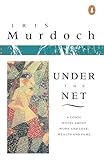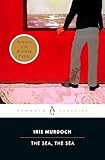I think it’s a symptom of the internet age, or my impending old age, or doom, that while I used to amble into a used book shop with no particular book in mind and leave satisfied with a bulging grocery bag, now I find myself a slave to a roster. Before, I would keep a vague running list of books I wanted to read, which basically encompassed the whole of literature as I understood it, so that any pile of two dollar books was bound to yield several items of interest. And now I want what I want when I want it.
 Under the Net was a long-time bee in my bonnet. There are so many Iris Murdoch novels, in so many printings; they are a fixture in secondhand book shops. When I realized that this one, her first, was on the Modern Library list, I thought I was bound to come across it before too long. For nine months it eluded me, although in pursuit of that title I managed to read five other Murdoch novels. In the same way, I read Black Boy instead of Native Son, and Young Torless instead of The Man Without Qualities, and loathsome Henderson the Rain King instead of Herzog. Which is a good thing! I’m better for having read them all. But every year that goes by finds me less happy to cast the net in this haphazard fashion (hence my summer of discontent). I require specific titles now. I’ve undergone a paradigm shift. It’s kind of a bummer, actually.
Under the Net was a long-time bee in my bonnet. There are so many Iris Murdoch novels, in so many printings; they are a fixture in secondhand book shops. When I realized that this one, her first, was on the Modern Library list, I thought I was bound to come across it before too long. For nine months it eluded me, although in pursuit of that title I managed to read five other Murdoch novels. In the same way, I read Black Boy instead of Native Son, and Young Torless instead of The Man Without Qualities, and loathsome Henderson the Rain King instead of Herzog. Which is a good thing! I’m better for having read them all. But every year that goes by finds me less happy to cast the net in this haphazard fashion (hence my summer of discontent). I require specific titles now. I’ve undergone a paradigm shift. It’s kind of a bummer, actually.
(I do know all about libraries, and I cherish them. But I like to own the books that I read, and I like to read books that I own. In case there is an emergency. It’s a thing about me.)
Anyway, I wanted to read Under the Net, and I got sick of looking in vain and reading things other than Under the Net, and I finally outsourced the job to the internet. I felt sort of guilty about this, like buying a pet instead of adopting. I did it media mail, which seemed more virtuous, in the manner of hard church pews and wooden teeth. After eight days, the novel arrived. All things considered, the experience was obscenely convenient.
Someone once said (it was me) that Iris Murdoch wrote so many novels that if you are in the mood to read something by her, there is probably a fresh one available. It’s like having a harem wherein all the inmates are related to one another and look alike, yet retain sterling qualities of their own. I quote myself not because I’m the last word on Iris Murdoch, but because the metaphor has useful application here. If Murdoch’s huge oeuvre is a harem of related women, then reading Under the Net is like going in back in time to meet their matriarch, coltish and sepia-toned on the day she was plucked from her village.
 I have always thought that The Sea, The Sea stands apart from the other Murdoch novels I’ve read, largely because of the spicy and pitch-perfect first person narrative. I thought, perhaps, that it was a prime example of late-ish Murdoch at the height of her powers. So I was surprised to discover find that her first novel, published in 1954, has more in common with The Sea² (1978), than any of the works published between (that I’ve read, of course). Like The Sea², Under the Net is written in the first person. The earlier novel’s narrator, translator and occasional writer Jack Donoghue, is kind of a feckless, easier-going, impoverished prototype of Charles Arrowby, who came a quarter century later. I suppose they really don’t have much in common, since Arrowby’s whole being is centered on being the opposite of feckless and easy-going and impoverished. But they are both educated, afraid of commitment, and very funny. They are memorable, varying somewhat from the stock cast of awful aesthetes and academes who populate the majority of her novels. Not that Donoghue isn’t one of those, but his way with words is considerably more amusing. Here, kicked out of one rent-free situation, he ponders the future:
I have always thought that The Sea, The Sea stands apart from the other Murdoch novels I’ve read, largely because of the spicy and pitch-perfect first person narrative. I thought, perhaps, that it was a prime example of late-ish Murdoch at the height of her powers. So I was surprised to discover find that her first novel, published in 1954, has more in common with The Sea² (1978), than any of the works published between (that I’ve read, of course). Like The Sea², Under the Net is written in the first person. The earlier novel’s narrator, translator and occasional writer Jack Donoghue, is kind of a feckless, easier-going, impoverished prototype of Charles Arrowby, who came a quarter century later. I suppose they really don’t have much in common, since Arrowby’s whole being is centered on being the opposite of feckless and easy-going and impoverished. But they are both educated, afraid of commitment, and very funny. They are memorable, varying somewhat from the stock cast of awful aesthetes and academes who populate the majority of her novels. Not that Donoghue isn’t one of those, but his way with words is considerably more amusing. Here, kicked out of one rent-free situation, he ponders the future:
It was certainly something of a problem to know where to go next. I wondered if Dave Gellman would harbour us. I fondled the idea, though I suspected it was no good. Dave is an old friend, but he’s a philosopher, not the kind that tells you about your horoscope and the number of the beast, but a real one like Kant and Plato, so of course he has no money.
 The whole experience of Under the Net was surprising. Unless one has made a pointed effort to study them, one can have only a hazy sense of the zeitgeist of decades and places in which one hasn’t lived. That said, Iris Murdoch is so relentlessly urbane and modern that Under the Net seemed to me much younger than its 55 years. I’m aware that drinking and being feckless and running around was not unheard of in the 1950s–I did read Lucky Jim (also published 1954. In fact, I think Jim Dixon could conceivably have enjoyed a matey bender with Jack Donaghue and company). But the people of Under the Net seemed very hip, or at least as though they could have easily populated a later novel. Perhaps it’s not that Murdoch was cutting-edge, but that her eternal engagement with the pedantic, the bachanalian, and the emotionally stunted will never go out of style.
The whole experience of Under the Net was surprising. Unless one has made a pointed effort to study them, one can have only a hazy sense of the zeitgeist of decades and places in which one hasn’t lived. That said, Iris Murdoch is so relentlessly urbane and modern that Under the Net seemed to me much younger than its 55 years. I’m aware that drinking and being feckless and running around was not unheard of in the 1950s–I did read Lucky Jim (also published 1954. In fact, I think Jim Dixon could conceivably have enjoyed a matey bender with Jack Donaghue and company). But the people of Under the Net seemed very hip, or at least as though they could have easily populated a later novel. Perhaps it’s not that Murdoch was cutting-edge, but that her eternal engagement with the pedantic, the bachanalian, and the emotionally stunted will never go out of style.
The plot of Under the Net doesn’t bear summarizing. It is farcical and, I dare say, “rollicking;” there’s even a dog who stars in movies. I am unused to feeling so little feminist rage during a Murdoch novel; this one was light-hearted and lacked the sinister undertones present in, for example, The Sacred and Profane Love Machine and Message to the Planet. Under the Net could even be called a buddy novel; Donoghue and his Irish familiar, Finn, reminded me not a little of my favorite John Irving book, The Water Method Man, and the adventures of Bogus Trumper (also a translator), and Merrill Overturf described therein.
I find it odd that this novel would make it onto the Modern Library list over TS². It’s a little fluffy. But, as we’ve been hearing so much recently, lists are problematic, and the Modern Library list is so problematic on so many levels that its defects no longer shock. Pluralities are weird. Still, Under the Net’s presence on the list caused me to hunt it down and read it, which not only caused me to have a nice Sunday afternoon (it’s short), but freed up a spot on the roster. That’s one for the list. Then again, the existence of a list only serves to codify things and thus intensify the need for a roster, which causes me to have fewer pleasant afternoons digging through bookshops, and more neurotic episodes on the internet. That’s one against.
Anyway, Under the Net was fun and I liked it. I’ll leave you with a word from Jack, who has troubles of his own:
I glanced hastily through the manuscripts. Once before, in a rage, Magdalen had torn up the first sixty stanzas of an epic poem called And Mr Oppenheim Shall Inherit the Earth. This dated from the time when I had ideals. At that time too it had not yet become clear to me that the present age was not one in which it was impossible to write an epic. At that time I naively imagined that there was no reason why one should not attempt to write anything that one felt inclined to write. But nothing is more paralyzing than a sense of historical perspective, especially in literary matters . . . But to return to Mr Oppenheim; my friends had criticized the title because it sounded anti-Semitic, though of course Mr Oppenheim simply symbolized big business, but Madge didn’t tear it up for that, but out of pique, because I broke a lunch date with her to meet a woman novelist. The latter was a dead loss, but I can back to find Mr Oppenheim in pieces. This was in the old days, but I feared that the performance might have been repeated. Who knows what thoughts were passing through that girl’s mind while she was deciding to throw me out? There’s nothing like a woman’s doing you an injury for making her incensed against you. I know myself how exasperating it is of other people to put themselves in positions where you have to injure them.









